The Philadelphia Flyers have a rich history of team captains. Of course, Bobby Clarke immediately comes to mind. In fact, when I asked on Twitter, fans overwhelmingly voted Clarke as the greatest Flyers captain of all time. Still, the list includes other legends like Eric Lindros and Claude Giroux. Since the Flyers entered the league in 1967, they’ve had 18 captains in all but two seasons (1992-93 and the lockout season of 2004-05). Here’s the complete list of those who have donned the “C” for Philadelphia.
Lou Angotti (1967-68)
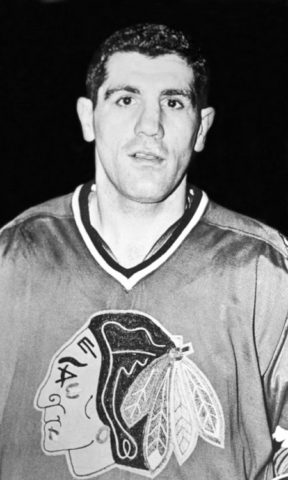
The Flyers snagged Lou Angotti from the Chicago Black Hawks (as they were then known) with the 33rd overall pick in the 1967 NHL Expansion Draft. He then served as captain during the Flyers’ inaugural season. Unlike other teams that struggled in their early years, the Flyers entered the NHL guns blazing. They won the West Division that season before losing to the St. Louis Blues in the first round of the playoffs.
As for Angotti, he had the best season of his ten-year career. He recorded 12 goals and 37 assists, a career-high along with this 49 points. Unfortunately, it was his only season in Philadelphia. He was involved in a three-team trade that offseason which ultimately sent him to the Pittsburgh Penguins.
After one season in Pittsburgh, he returned to the Black Hawks and spent time with the St. Louis Blues and the Chicago Cougars of the now-defunct World Hockey Association before he retired. Following his playing career, Angotti was head coach of the Pittsburgh Penguins and was a color commentator for the Blackhawks. He remains active with the Blackhawk Alumni Association.
Ed Van Impe (1968-73)
Like Angotti, Ed Van Impe was also claimed from the Black Hawks in the 1967 NHL Expansion Draft. Somewhat foolishly, they decided to leave him unprotected despite that he was coming off a strong rookie season when he finished second in Calder Trophy voting behind Bobby Orr.
Related: Broad Street Bullies More Than Goons, Fists & Enforcers
A strong, physical defenseman, Van Impe helped the “Broad Street Bullies” earn their reputation across the league. He was a force to be reckoned with, especially clearing opponents from the front of the net. He didn’t limit his toughness to his opponents, though. Upset with a call during a game in February of 1973, he hit referee Brian Lewis and earned an eight-game suspension. Van Impe is also remembered for knocking Soviet superstar Valeri Kharlamov unconscious with an open-ice hit in the second period of an exhibition game during the 1976 Super Series.
Shortly after this exhibition game, Van Impe was traded to the Penguins, with whom he finished his career. By the end of his career, Van Impe was a two-time Stanley Cup champ with the Flyers (1974, 1975), a three-time NHL All-Star (1969, 1974, 1975) and a 1993 inductee into the Flyers Hall of Fame.
Bobby Clarke (1973-79; 1982-84)
It’s no surprise that Mr Flyer was a team captain. What is surprising is that he gave up his captaincy, but we will get to that. Bobby Clarke’s greatness cannot be overstated. During his 15-year career, all spent in Philadelphia, Clarke lit up the stat sheet. He still holds several Flyers records, including games played, assists and points.
Clarke was equally talented on the other side of the puck. He was a tenacious checker – and may have checked a bit too much. In 1,144 games, he racked up 1,453 penalty minutes – an incredible stat for such an offensively gifted player. He also didn’t have a single season with a negative +/- rating and ranks fifth in NHL history with a career plus-507.
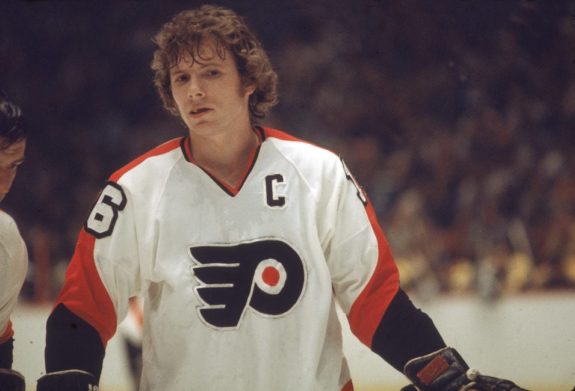
Clarke was so well-respected that after the 1978-79 season, he became a player-coach for the Flyers, but in order to do so, he had to relinquish his captaincy. In his first season in the new role, the Flyers went on a 35-game undefeated streak, the longest undefeated streak in United States professional sports. In his final two seasons, Clarke gave up his coaching duties which allowed him to regain the captaincy from Bill Barber during the 1982-83 season. Clarke finished his career a three-time Hart Trophy winner and two-time Cup champion.
Following his playing career, Clarke became a general manager with stints in Philadelphia, with the Minnesota North Stars, Florida Panthers, and again in Philly. Though he failed to win a Stanley Cup as a GM, he built his teams into contenders. Clarke was an easy inductee into the Hockey Hall of Fame in 1987 and is widely recognized as the greatest Flyer of all time.
Mel Bridgman (1979-81)
The Flyers selected Mel Bridgman first overall in the 1975 NHL Amateur Draft. Never a prolific scorer, Bridgman was a consistent offensive contributor and a smart defensive center. During his seven years in Philadelphia, he averaged close to 20 goals and 30 assists per season.
Bridgman was named captain in 1979 after Clarke became a player-coach. He wore the “C” for the next two seasons before being traded to the Calgary Flames. He also played for the New Jersey Devils and Detroit Red Wings before he finished his NHL career with the Vancouver Canucks. After his playing career, he went back to school and earned an MBA from the University of Pennsylvania. In 1992, he then became the inaugural GM of the Ottawa Senators. The Senators failed to make the playoffs during the two seasons that Bridgman held the position.
Bill Barber (1981-82)
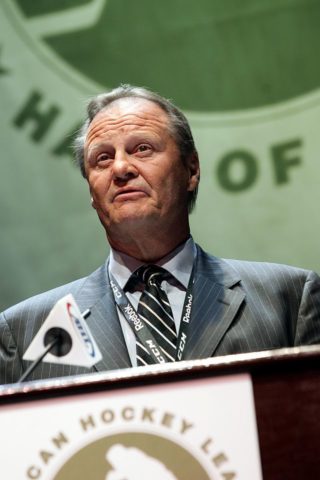
The Flyers’ all-time leading goal-scorer, Bill Barber captained the team in the 1981-82 season and in part of the 1982-83 season. He was drafted seventh overall by the Flyers in the 1972 NHL Amateur Draft and played his full 12-year career in Philadelphia. Though he was the Flyers’ top goal-scorer for many years, he didn’t earn the captaincy until his tenth season. His tenure as captain was brief, as Clarke regained the title the following December.
Still, Barber is remembered as one of the greatest Flyers of all time. During his career, he played in six NHL All-Star Games, scored 883 points in 903 regular-season games, and helped lead the Flyers to Stanley Cup victories in 1974 and 1975. He reached the 50-goal mark in 1975-76 and topped 40 goals on four other occasions. He was forced to retire after the 1984-85 season when he was unable to return from reconstructive knee surgery.
Related: Line of the Times – The Legion of Doom
The Flyers retired his No. 7 jersey in 1990, the same year that he was inducted into the Hockey Hall of Fame. After his playing career, Barber became a coach with the Flyers and won the Jack Adams award in 2001. He also helped the Tampa Bay Lightning win a Stanley Cup in 2004 as their director of player personnel. These days, Barber is back with the Flyers as a scouting consultant.
Dave Poulin (1984-89)
Replacing Barber and Clarke as captain is no easy task, but Dave Poulin did a fine job. During the five and a half seasons that Poulin was captain, the Flyers consistently made the playoffs and even went to two Stanley Cup Finals (both losses to the Edmonton Oilers).
Poulin was a star for Notre Dame and averaged nearly a point and a half per game during his college hockey career. He continued to dominate on his first pro team, Rögle BK Ängelholm of the Swedish Division One League. Fortunately, his head coach in Sweden was Ted Sator, who was also a scout for the Flyers. Sator put in a good word which eventually allowed Poulin to get his chance in the NHL. He then spent six seasons in Philadelphia.
During his first season in 1983-84, his 76 points set a new Flyers rookie point record. Following this impressive campaign, he became team captain for the next five and a half seasons. Arguably his best season was in 1986-87 when he won the Selke Trophy as the league’s top defensive forward.
In December of 1989, coach Paul Holmgren replaced Poulin as captain with Ron Sutter. Poulin was then traded to the Boston Bruins with whom he appeared in the 1990 Stanley Cup. After a brief stint with the Washington Capitals, Poulin retired midway through the 1994-95 season and spent the next ten years as Notre Dame’s hockey coach. He next served as VP of hockey operations for the Toronto Maple Leafs before being fired in 2014. He is now a hockey analyst for TSN. He was inducted into the Flyers Hall of Fame in 2004.
Ron Sutter (1989-91)
One of six brothers to play in the NHL, Ron Sutter was drafted fourth overall by the Flyers in the 1982 NHL Entry Draft. His twin brother, Rich, was selected tenth overall by the Penguins in the same draft. It only took a year for Rich to be traded to Philadelphia. United with his brother, Ron put up three of the best seasons of his career.
Once Rich moved on to the Canucks, Ron’s production dropped a bit, but he still managed to record close to 40 points per season. Ron was a strong defensive center and an occasional candidate for the Selke, finishing second in voting for the trophy in the 1985-86 season. Ron finally got the chance to captain the Flyers during his eighth season in the league.
He held this position for just two seasons. He was then traded to the Blues in 1991 where he was reunited with Rich. After that, Ron became a journeyman, playing for the Quebec Nordiques, the New York Islanders, Bruins, San Jose Sharks and Flames. He was coached by two of his older brothers – Brian in St. Louis, and Darryl in San Jose. After his playing career, Ron became a scout for the Flames.
Rick Tocchet (1991-92)
Despite being a sixth-round pick by the Flyers in the 1983 NHL Entry Draft, Rick Tocchet put together an impressive NHL career. He played the first seven and a half years of his career in Philadelphia and quickly became one of the team’s best players. During the 1989-90 season, he nearly broke the 100-point mark with 37 goals and 59 assists. After a 40-goal campaign the following season, Tocchet became captain of the Flyers for the 1991-92 season.
Related: The NHL’s Most Unbreakable Playoff Records
His tenure was short-lived, as he was traded just 42 games into the season to Pittsburgh for Mark Recchi, where he helped his team win the Stanley Cup. The following season in Pittsburgh, Tocchet recorded 109 points, the most of his career (fortunately, Recchi recorded 123 for Philadelphia that season). Like Ron Sutter, Tocchet was well-traveled. After the Penguins, he played for the Los Angeles Kings, Bruins, Capitals, and Phoenix Coyotes before finishing his career in Philadelphia.
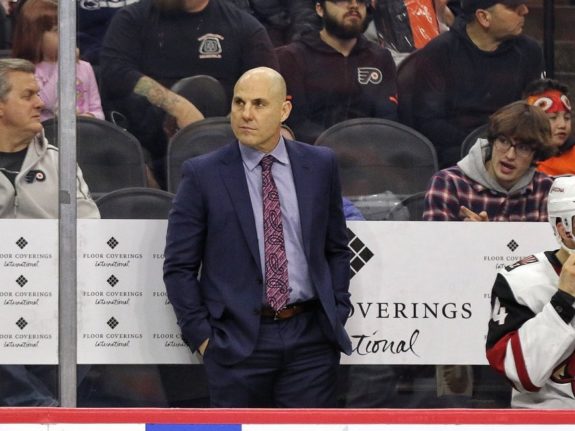
Tocchet retired after the 2001-02 season as a member of the 400-goal and 2,000-penalty minute club. He was a four-time NHL All-Star. Following his playing days, Tocchet turned to coaching and is now the head coach of the Arizona Coyotes.
Kevin Dineen (1993-94)
After the Flyers went a season without a captain, Kevin Dineen was given the “C” for the 1993-94 season. He spent the first seven and a half seasons of his career with the Hartford Whalers before being traded to the Flyers during the 1991-92 season where he paid instant dividends, recording 56 points in the remaining 64 games that season.
After a strong 1992-93 season, Dineen became the Flyers’ captain the following season. Unfortunately, as captain his production decreased, and his 42 points were the lowest since his rookie year. That was Dineen’s only season as captain. He played parts of the next two seasons in Philadelphia before being traded back to Hartford.
Dineen played for the Carolina Hurricanes, Senators and Columbus Blue Jackets before he retired. Like Tocchet, he turned to coaching after hanging up his skates and has since built a lengthy resume, which includes a two-year stint as head coach of the Panthers. He is now head coach of the San Diego Gulls, the AHL affiliate of the Anaheim Ducks.
Eric Lindros (1994-00)
After three captains in three consecutive seasons, Eric Lindros finally brought some stability to the position and served as the Flyers’ captain for nearly six seasons. He was drafted first overall in the 1991 NHL Entry Draft by the Nordiques but refused to play for them and was eventually traded to the Flyers for a package that included Peter Forsberg and two first-round picks.
Despite the hefty price, Lindros quickly proved his worth. At 6-foot-4 and around 230 pounds, he brought physicality to his elite scoring touch. He topped 40 goals in each of his first two seasons and was made captain in just his third season. The season was shortened due to a lockout, but Lindros still recorded 70 points in 46 games and won the Hart Trophy. Along with John LeClair and Mikael Renberg, Lindros terrorized the league on the Flyers’ “Legion of Doom” line.
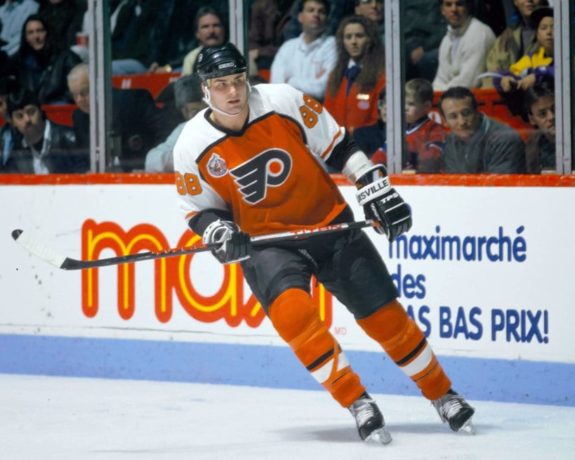
Unfortunately, after eight seasons, Lindros’ relationship with the Flyers and GM Bobby Clarke deteriorated. Towards the end of his time in Philly, he began to suffer a series of injuries, and Clarke questioned his toughness. Lindros then sat out the entire 2000-01 season, after recovering from his latest concussion and refused to accept a two-way qualifying offer with a minor league provision from the Flyers.
Related: Hockey Documentaries to Watch Right Now
Clarke traded Lindros to the New York Rangers the following season where he averaged close to a point per game over three seasons. He spent his final two seasons with the Maple Leafs and Dallas Stars. Despite the bitter ending in Philly, Lindros is still one of the greatest Flyers of all time. He was inducted into the Hockey Hall of Fame in 2016 and had his No. 88 jersey retired in 2018.
Eric Desjardins (2000-01)
Defenseman Eric Desjardins became captain in March of 2000 after Lindros was stripped of the title after his complaints about the Flyers’ medical staff. Nonetheless, Desjardins only held the position for a few months before quitting as captain in October of 2001. His reason was:
“When I first took this, I looked at it as a big challenge. It was tough last year. I didn’t feel comfortable. I never felt like I was doing everything right. That was a big concern and it was affecting my play,”
(from ‘Desjardins Quits as the Flyers’ Captain,’ The New York Times, 10/24/01).
Desjardins came to the Flyers by way of the Montreal Canadiens who drafted him 38th overall in the 1987 NHL Entry Draft. After a few seasons in the league, he became an elite defenseman and was selected to the 1992 NHL All-Star Game. In February 1995, he was traded to the Flyers along with LeClair and Gilbert Dionne for Recchi and a third-round pick.
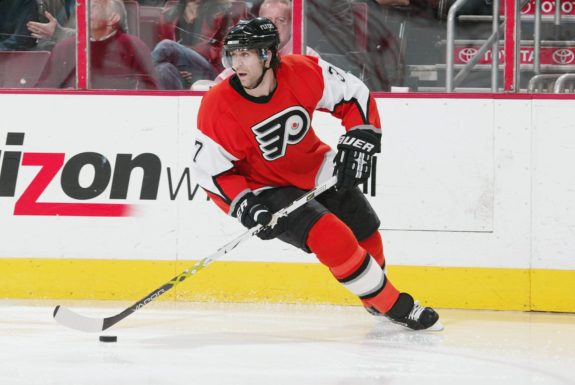
With the Flyers, Desjardins helped solidify the team’s defense and won seven Barry Ashbee trophies, awarded to the Flyers’ top blue-liner. He was twice selected to the NHL All-Star second team. He played the last 11 seasons of his career with the Flyers and his 396 points ranks second in team history among defensemen behind only Mark Howe’s 480. He was inducted into the Flyers Hall of Fame in 2015.
Keith Primeau (2001-06)
Though it took nine years and three teams for Keith Primeau to come to Philly, the Flyers still got three quality seasons out of him. In fact, in his second with the Flyers in 2000-01, he tied his career-high of 71 points.
The centre was drafted third overall in the 1990 NHL Entry Draft by the Red Wings and spent six seasons there, then one with Hartford, and two with Carolina. In 1999-2000, he forced a trade after holding out for most of the season and the Hurricanes sent him to the Flyers in exchange for a package that included Rod Brind’Amour.
The Flyers likely regret that trade, but they still got production from Primeau. Furthermore, after Desjardins had enough of the captaincy, Primeau was the obvious choice as his successor given his experience. He was also clutch in the postseason, especially during the 2004 Cup Playoffs when he recorded 16 points. The two-time NHL All-Star retired in 2006 after suffering a concussion the previous season. These days, he coaches youth hockey and owns a deli in Philadelphia.
Derian Hatcher (2006)
Though Derian Hatcher may best be remembered as a Dallas Star, and the first American-born captain to win the Stanley Cup, he finished his career with the Flyers and briefly served as their interim captain.
Hatcher was drafted eighth overall by the North Stars in the 1990 NHL Entry Draft. He played two seasons in Minnesota and then moved with the franchise to Dallas. There, he played another ten seasons and won the 1999 Stanley Cup. A physical defenseman and strong checker, Hatcher racked up close to 20 assists and 100 penalty minutes per season in Minnesota and Dallas. After his time in Dallas, he signed a five-year, $30 million contract with the Red Wings, but only played 15 games due to a knee injury. The Red Wings bought out the remainder of his contract, allowing him to sign with the Flyers.
He became the Flyers’ interim captain after Primeau suffered a concussion. Unfortunately, Hatcher was not the same player in Philadelphia that he was in Dallas and retired in 2009 after sitting out the previous season due to more knee troubles. Though he was a Flyers captain only briefly, Hatcher is the longest-serving captain in Stars history. He was inducted into the United States Hockey Hall of Fame in 2010 and is now a co-owner and head coach of the Sarnia Sting of the Ontario Hockey League.
Peter Forsberg (2006-07)
The Flyers drafted Peter Forsberg sixth overall in the 1991 NHL Entry Draft, and before he ever played a game for them he was sent to the Nordiques in the package to acquire Lindros. Fortunately, the Flyers had the opportunity to benefit from Forsberg’s services later in his career.
Though he stayed in Sweden for three seasons, he quickly established himself in the NHL when he joined the Nordiques for the 1994-95 season. In that lockout-shortened season, he scored 50 points in 47 games to win the Calder Trophy. The next season, the franchise moved to Colorado and won the Stanley Cup. Forsberg was a big part of his team’s success, with a career-high 116 points in the regular season and another 21 in the playoffs.
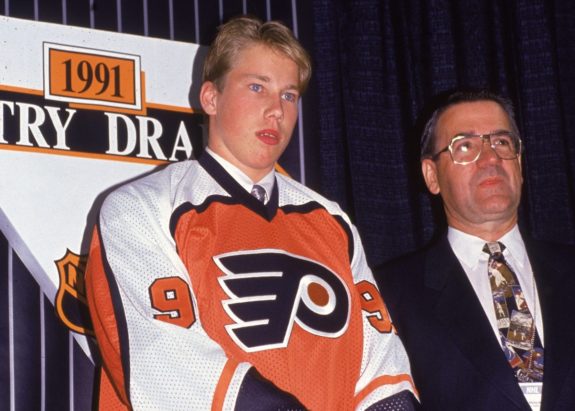
After his tremendous 1995-96 season, Forsberg continued to dominate the NHL. A few highlights: he was selected for the cover of the NHL 98 video game, he led the Avalanche to a second Stanley Cup in 2001 and he won the Hart Trophy and the Art Ross Trophy with a league-high 77 assists and 106 points in the 2002-03 season. Unfortunately, the Avalanche weren’t able to re-sign him in 2005 after the implementation of a salary cap. As a free agent, the Flyers wasted no time in signing the player they had drafted 14 years earlier.
Forsberg played less than two full seasons in Philadelphia but still recorded an incredible 115 points in 100 games. He became captain during his second season with the Flyers but was sent to the Nashville Predators at the trade deadline. He finished the season there, before re-joining the Avalanche the following season. He spent the next two seasons with Modo, his old team in Sweden. Forsberg hinted at retiring after his second season there but returned once more to Colorado in 2010 to play a final two games in the NHL. He retired for good after that season and his number was retired by the Avalanche in 2011 and he was inducted to the Hockey Hall of Fame in 2014.
Jason Smith (2007-08)
Jason Smith had an impressive 15-year career, playing over 1,000 games for five teams. The defenseman was drafted 18th overall in the 1992 NHL Entry Draft by the Devils. He was traded to the Maple Leafs in 1997 and to the Oilers in 1999.
Edmonton was where his career really took off. Smith served as the Oilers’ captain for five seasons, and led his team to the Stanley Cup Final in 2006. He became just the fourth Oilers captain to accomplish this feat, joining Lee Fogolin, Wayne Gretzky and Mark Messier.
In 2007, he was traded one more time to the Flyers. In his lone season as captain, Smith led the Flyers to the Eastern Conference Final. Though the Flyers fell in five games to the rival Penguins, it was an impressive season for a team that had been the worst in the NHL the season before. Smith signed as a free agent with the Senators for his final season in 2008-09. He later served as an assistant coach in Ottawa and as the head coach of the Western Hockey League’s Kelowna Rockets.
Mike Richards (2008-11)
The Flyers took Mike Richards 24th overall in the 2003 NHL Entry Draft. He returned to junior for two more seasons but quickly made his mark in the NHL after joining the Flyers for the 2005-06 season when he scored a goal in his first NHL game and added his first-career hat-trick later that season.
Richards became a star during the 2007-08 season, leading the Flyers with 75 points to earn the only All-Star Game appearance of his career. That season, he also signed a 12-year contract extension worth $69 million. Richards played just three more seasons with the Flyers after that and was team captain for all three. He scored over 60 points in each of those three seasons and was one of the Flyers’ best players.
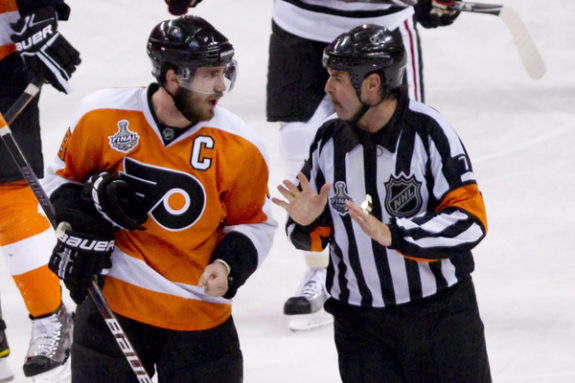
Perhaps because of his lengthy contract, the Flyers traded Richards to the Los Angeles Kings before the 2011-12 season which caught the Flyers star by surprise. On being traded, he said:
“I was very shocked. At first I was shocked and then excited – I’m excited to move out to L.A. and be a part of a team that has a ton of great players. I’m just looking forward to helping them out,”
(from ‘Trade Leaves Mike Richards In A State Of Shock,’ Philadelphia Sports Daily, 6/24/11).
For Richards, the Flyers got a big haul that included Wayne Simmonds, Brayden Schenn and a second-round draft pick. As for Richards, his productivity immediately declined with the Kings. He never topped 50 points again in his career; however, he did win two Stanley Cups. He played four seasons in Los Angeles and a final 39 games with the Capitals in 2015-16.
Chris Pronger (2011-12)
After Richards, the Flyers returned to their strategy of choosing a veteran at the end of his career to be captain which they had done with their previous four captains, Smith, Forsberg, Hatcher and Primeau. With Richards gone, who better to be captain than the legendary Chris Pronger?
Related: Ranking Every Hart Trophy Winner Since 2005
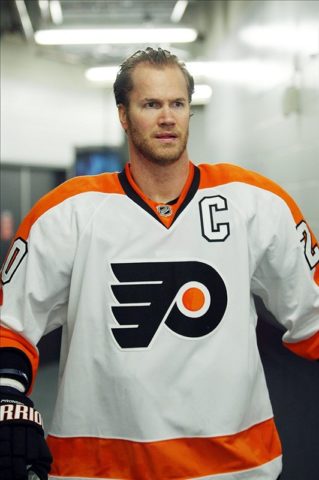
Pronger was selected second overall by the Whalers in the 1993 NHL Entry Draft. A strong 25-assist campaign in his first season helped land him on the NHL All-Rookie Team. He played one more season in Hartford before he was traded to the Blues for the more established star, Brendan Shanahan.
His career took off in St. Louis. In just his third season, Pronger was named team captain. Two seasons later, he recorded a career-high 62 points and won the Norris and Hart Trophies. He was the first defenseman to be named NHL MVP since Bobby Orr in 1972. After that, and excluding an injury-shortened season in 2002-03, Pronger scored at least 47 points in each of his final three seasons with the Blues.
He was traded to the Oilers prior to the 2005-06 season. He only played one season there but recorded 56 points. He then requested to be traded again for personal reasons and Oilers fans dubbed him “Public Enemy No. 1.” Pronger was traded to the Anaheim Ducks where he spent three seasons. In 2007, he helped lead the Ducks to the only Stanley Cup victory of his career.
In 2009, he was traded once more to the Flyers. In his first season in Philly, he recorded 10 goals and 45 assists, but he was not nearly as productive after that, recording just 25 points the next season and 12 points in his last one. That final season, he was named team captain, although post-concussion syndrome ended his season in mid-December.
After retiring, Pronger joined the Panthers as their senior advisor of hockey operations. He was named to the Hockey Hall of Fame in 2015 and the NHL named him one of the 100 Greatest NHL Players in history in 2017. In 2020-2021, the Blues will retire his No. 44 jersey.
Claude Giroux (2013-present)
This list would not be complete without Claude Giroux. Since he was drafted 22nd overall by the Flyers in 2006, he has played 13 seasons in Philadelphia. His first couple of seasons were good, but his career flourished once Richards and Jeff Carter were traded in June 2011. It allowed Giroux to become his team’s first-line center.
The next season, he led the Flyers with 93 points. In fact, from 2011-12 through 2019-20, he has averaged 0.97 points per game. Along the way, Giroux has etched himself into the Flyers’ record books. He is second in assists, fourth in points, tenth in goals, and third in games played in franchise history. At just 32 years old, he has plenty of time left to leapfrog some of the players ahead of him.
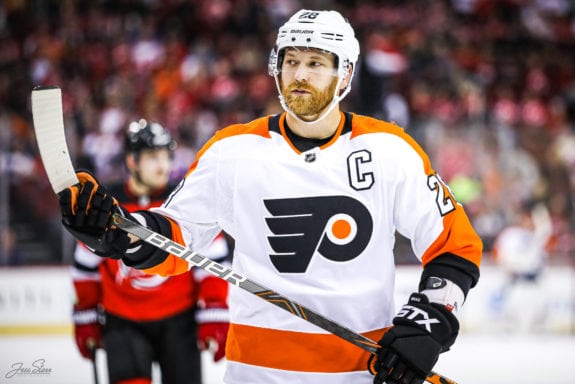
Giroux has been captain since midway through the 2012-13 season. Assuming he holds the position for a couple more seasons, he will become the longest-tenured captain in team history. Already a six-time NHL All-Star, he may also warrant consideration for the Hockey Hall of Fame after he hangs up his skates.
There you have it: 18 captains. Though they exhibited varying degrees of success in their careers, each of these players are linked through their one-time ownership of the “C”. For that, they will forever have a place in Flyers history.
For everything Flyers check out our Philadelphia Flyers Page.